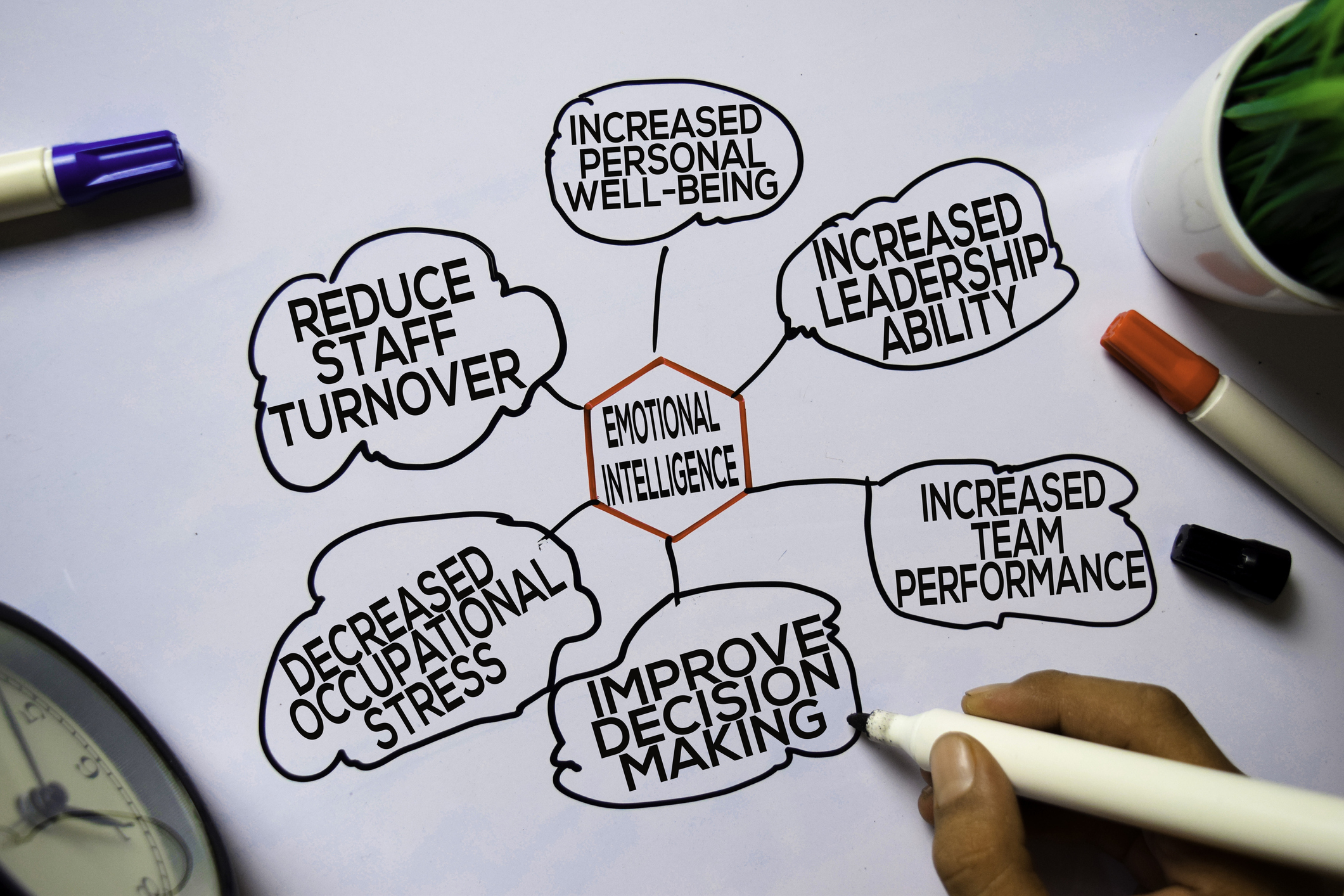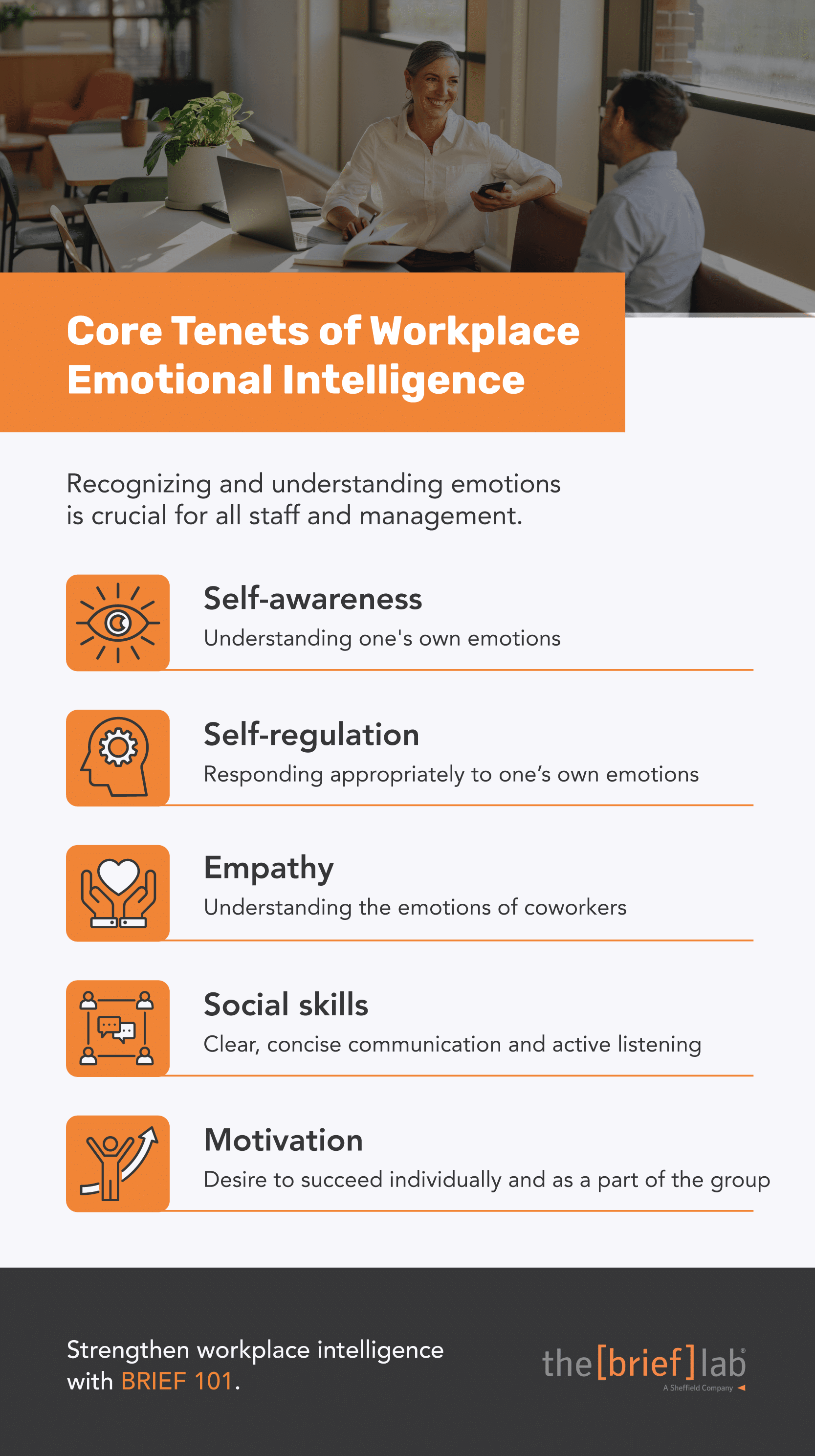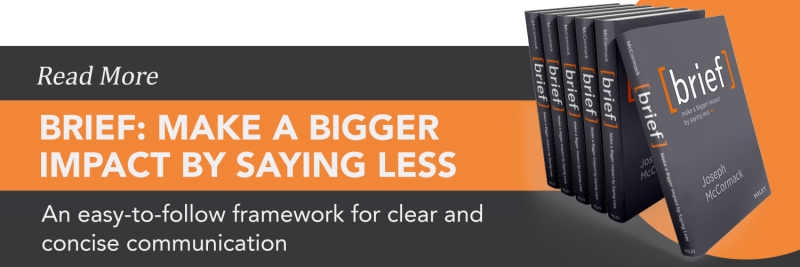Emotional Intelligence in the Workplace

Teamwork and collaboration are essential for success, and emotional intelligence in the workplace is a critical skill. It is important for team building and also promotes healthy relationships with colleagues and clients. Here, we’ll explain what emotional intelligence is, why it is crucial in the workplace, and how it can be learned or developed over time. We will also explore the role of emotional intelligence in leadership and communication, and how it can help individuals grow professionally.
What is Emotional Intelligence?
Emotional intelligence, often referred to as EQ or EI, is the ability to recognize and understand our own emotions. It goes beyond simple self-awareness and involves being aware of how our emotions impact ourselves and others. Developing emotional intelligence is the first step towards better self-management and relationship management skills. High EQ individuals are able to navigate stressful situations with ease, offer constructive feedback, and demonstrate social awareness by understanding and empathizing with other people’s feelings. Business leaders with strong emotional intelligence can communicate effectively, and manage setbacks, biases, and even workplace gossip.
The Role of Emotional Intelligence in the Workplace
Leaders who possess high emotional intelligence tend to be more effective and respected in the workplace. EI not only enhances communication but also reduces conflicts among team members. It plays a crucial role in helping professionals express themselves clearly and concisely, enabling them to build strong relationships with clients and prospects.
EI can be cultivated and enhanced over time. It differs from intellectual intelligence, or IQ, as it centers around social skills and the ability to understand and manage emotions effectively. Having a high EQ can have a significant impact on job satisfaction and workplace morale. By developing self-awareness, self-regulation, and social awareness, individuals with high emotional intelligence can navigate stressful situations, provide constructive feedback, and demonstrate empathy towards others. Developing and honing EI skills can help individuals bounce back from setbacks and foster healthier relationships in both personal and professional settings.
The Role of EQ in Effective Communication
Emotional intelligence (EQ) plays a pivotal role in enhancing communication skills for several reasons:
- Empathy: EQ enables people to understand and tune into the emotions and perspectives of others, making it easier to connect with customers and co-workers on a deeper level and respond in ways that resonate with their feelings and needs.
- Active Listening: High EQ promotes active listening, which means truly focusing on what the other person is saying, rather than just waiting for your turn to speak. This helps build trust and rapport in all interactions.
- Self-Awareness: Being in tune with one’s own emotions allows people to recognize and manage any personal biases, prejudices, or emotional triggers that might interfere with effective communication.
- Effective Expression: Recognizing and understanding emotions means professionals can express feelings, needs, and thoughts more clearly and concisely. This reduces the risk of misunderstandings.
- Conflict Resolution: People with a heightened EQ are better equipped to navigate conflicts. You can identify the underlying emotions at play, address them constructively, and find solutions that respect all parties involved.
- Feedback Reception: High emotional intelligence can make it easier to accept feedback without becoming defensive. This is because you can differentiate between constructive criticism and your own emotional reactions.
- Non-Verbal Cues: EQ helps in reading and interpreting non-verbal cues such as body language, tone of voice, and facial expressions. This offers a more holistic understanding of what the other person is communicating.
- Building Stronger Relationships: By understanding and valuing the emotions of others, you can build stronger, more trusting relationships, both personally and professionally.
In essence, emotional intelligence equips you with the tools and awareness needed to communicate more effectively, ensuring your messages are clear, your responses are thoughtful, and your interactions are more meaningful.

Can EQ be Learned or is it Inherent?
Certainly, emotional intelligence can be learned and developed over time. Some people naturally display higher levels of EI from an early age due to their upbringing or inherent personality traits, but those who wish to improve their EI can do so through dedicated practice, education, and self-awareness. Various communication training programs, workshops, and resources are available to help people understand how to harness and manage their emotions to enhance their communication skills. Just as one can train the mind for cognitive tasks or the body for physical challenges, with consistent effort and the right techniques, one can enhance their capacity to recognize, understand, and manage emotions in both oneself and others.
EQ = Self-Awareness, Self-Management, and Empathy
In conclusion, emotional intelligence is a crucial skill that can greatly impact workplace relationships and overall success. It involves being self-aware of and managing your own emotions, as well as understanding and empathizing with the emotions of others. Emotional intelligence can lead to better communication, conflict resolution, and teamwork, creating a positive work environment. While some aspects of emotional intelligence may come naturally to individuals, it is also a skill that can be developed and improved upon through self-awareness, practice, and learning from experiences. Investing in emotional intelligence training and development can have significant benefits for both individuals and organizations. So, take the initiative to enhance your emotional intelligence and watch how it positively transforms your workplace interactions.
How The BREIF Lab Can Help
At The Brief Lab, we specialize in concise communication courses, writing workshops, and meetings courses designed for organizational leaders committed to enhancing their communication skills. Professional leaders recognize the value of concise communication as a core skill that sets them apart, and emotional intelligence is necessary for brevity. You must understand your audience or listener, and also understand your own impulse to include more information than is necessary. When you and your team learn to be brief, you will:
- Reduce time spent in meetings, briefings and your inbox.
- Make better decisions faster based on clear, consistent information.
- Develop consensus that unifies effort and encourages follow-through.
- Enhance understanding of your mission and message.
- Improve operational efficiency and effectiveness.
- Ensure clarity to reduce confusion and re-work.
Contact us to learn about our offerings; we’ll teach you and your team how to embrace concise communication and develop a culture of brevity.
Frequently Asked Questions
How can emotional intelligence improve workplace relationships and communication?
Emotional intelligence plays a crucial role in enhancing workplace relationships and communication. By understanding and managing their own emotions, individuals can effectively interpret and respond to the emotions of others. This leads to better communication, conflict resolution, and teamwork. Developing emotional intelligence skills through training and practice is key.
How can emotional intelligence contribute to overall workplace success and productivity?
Emotional intelligence plays a crucial role in workplace success and productivity. By understanding and managing their own emotions, as well as those of others, employees with high emotional intelligence can build positive relationships, foster teamwork and collaboration, and effectively navigate conflicts. Cultivating emotional intelligence in the workplace leads to increased productivity and job satisfaction among employees.
What are some ways that emotional intelligence can be developed and improved?
Develop and improve emotional intelligence by practicing self-awareness, reflecting on emotions and reactions. Enhance empathy by actively listening and understanding others’ perspectives. Improve communication skills by being clear and concise in messaging. Seek feedback to identify areas for improvement.
Are there any industries or job roles where emotional intelligence is particularly important?
Industries and job roles that involve working with people require high levels of emotional intelligence. Healthcare, education, sales, and customer service are examples of industries where emotional intelligence is particularly important. Managers, leaders, and team members in any industry can benefit from developing emotional intelligence to build strong relationships, improve communication, and navigate conflicts effectively.
